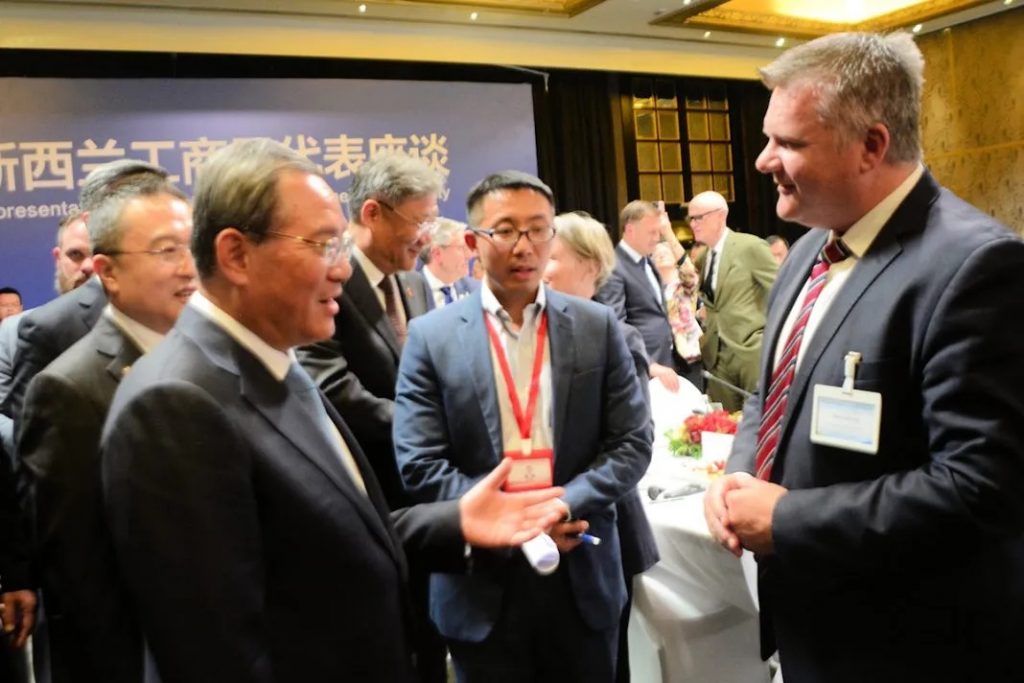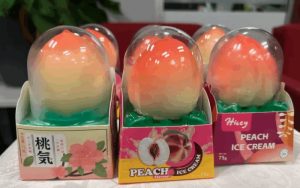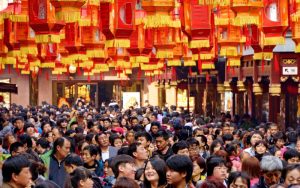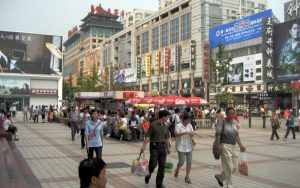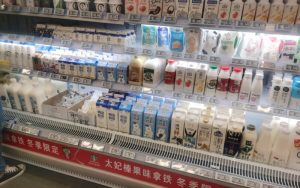
One simple statistic said it all: China Premier Li Qiang asked Fonterra CEO Miles Hurrell what percentage of the company’s overall sales were made in China.
“Thirty per cent,” said Hurrell.
In other words, New Zealand’s largest company is more or less dependent on the Chinese market.
But Hurrell is not alone.
When the Auckland Chamber of Commerce hosted Li and a team of Chinese Ministers to a summit with New Zealand business leaders on Friday, Li heard story after story of what China means to New Zealand business.
POLITIK was one of three New Zealand journalists invited to attend the summit.

It is obvious that China sees its links with New Zealand business as the key to its whole relationship with New Zealand.
Premier Li asked the leaders to become a bridge between China and New Zealand to help New Zealanders see China “in a more objective way.”
Business has a lot at stake in the China relationship and sees the country as fundamental to New Zealand’s economic success.
That should not be surprising; 30 per cent of all New Zealand exports went to China over the 12 months ended April 2024.
China took more exports from New Zealand than our next two biggest markets (Australia and the United States) combined.
Consequently, the Premier’s reception at the Cordis Hotel, where the summit was held, was much warmer than the reception he had received the previous day from the Prime Minister at Government House in Wellington.
And it was Hurrell who most acutely recognised that dichotomy when he talked about the need for the relationship between China and New Zealand to be based on trust.
That was obviously not present in Wellington, where the Prime Minister felt it necessary to devote half of his meeting with Li to “concerns.”
“Trust’ has been a theme from Chinese politicians and diplomats for some time now; President Xi Jinping told Prime Minister Jacinda Ardern in 2019 that “our two sides must trust each other to pursue mutual benefits and strive to open up new ground in our bilateral relations.”
But since Ardern met Xi, Chinese foreign investment into New Zealand has slowed from $1.3 billion in 2023 to just $579 million last year.
According to Chinese media at the time, Xi told Ardern in the 2019 meeting that China wanted New Zealand to make it easier for Chinese investment.
“President Xi Jinping called on New Zealand to provide a fair and unbiased business environment for Chinese investors,” reported the state-owned China Daily.

One example of Chinese investment in New Zealand is Facteon, which builds advanced robots for manufacturing processes. It was spun out of Fisher and Paykel and is now part of the Chinese-owned Haier Group (which owns Fisher and Paykel).
Its CEO, John Cochrane, said he personally witnessed the benefits of large and small coming together.
“A company as large as Haier and a small as Facteon and a country as large as China and a country as small as a New Zealand. These experiences fill me with confidence,” he said.
Ultimately, it is what we sell to China that defines the economic relationship.
Te Rūnanga o Ngāi Tahu chair Justin Tipa outlined his iwi’s sales to China, saying that much of its dairy and timber output went to China. He anticipated that Ngai Tahu tourism ventures would host 90,000 Chinese visitors this year.
“Seafood is an industry Ngai Tahu has a long and deep association with. A major part of our culture comes from our ability to offer hospitality through the delicacies our ancestors sourced from the ocean,” he said.
“The history is reflected in our commercial activities.
“Through the emphasis we have placed on building a world-class seafood company, we’ve been exporting lobster to China for over 20 years.
“At present, Ngai Tahu is expected to export over 500 metric tons of large lobster to China each year.”
Tipa’s presentation engaged Li, who said lobsters were one of China’s middle-class favourite dishes.
“If you can get one per cent of the Chinese population to eat one lobster a year, then you can export 14 million lobsters to China,” he said.
“That’s a hefty number!
“So I hope you can keep expanding your market.”
Several New Zealand speakers emphasised the partnerships they had developed with Chinese individuals and organisations.
Sirma Karapeeva, the CEO of the Meat Industry Council, said her organisation had longstanding relationships and contacts with their counterparts in China.
“That’s really important to create business-to-business relationships and partners and market,” she said.
But beyond the traditional primary product exports, New Zealand is also developing intellectual property exports to China, the second largest source country (after Australia) for tourists.
After Air New Zealand CEO Greg Foran outlined the history and scale of Air New Zealand’s links with China, Premier Li thanked him.
“During COVID-19, many transportation means and personal exchanges were affected. However, Air New Zealand kept your direct flights with Shanghai. Thank you very much,” he said.
“I was working in Shanghai and your team in Shanghai was very effective. Thank you.”

Li sprinkled those personal references throughout his responses as the business leaders made their presentations.
It even appeared he was a Lord of the Rings fan when he asked Weta Workshop’s founder and head, Sir Richard Taylor, how such big eyes had been created in the characters.
Taylor outlined his company’s 26-year history of working in China and how he had made close friends with many of his Chinese collaborators.
As a consequence, he had rushed to Sichuan after the 2008 earthquake to see whether he could help.
That brought him to the attention of the government, and more work flowed, including a current massive museum project.
“I was invited to be the senior creative director of a museum in Zhuhai celebrating traditional Chinese medicine,” he said.
“That saw our company design a 37,000 square meter, five-story building.
“We designed it in the shape of a lotus flower petal alighting on water.”
He said he believed it was one of the most unique and wonderful museums, not only in China but in the world.
“Sadly, due to Covid, that museum still sits unopened.
“Maybe I could impress on your good offers to, possibly offer a hand of assistance to open that museum because I would argue that that museum is the greatest acknowledgement and largest scale creative endeavour between our two countries, and it certainly deserves to stand as a tribute to the friendship and bridge that we have.”

Les Mills CEO, Philip Mills offered a western perspective on health explaining that his company was in the fitness industry.
“There is no country in the world without the problem of obesity,” he said, at which point Li smiled and patted his stomach.
Mills, who has been a major donor to the Greens, said he was also on the board of Pure Advantage, which promoted green growth and tried to deal with climate change.
“I really just personally want to congratulate China and you on the wonderful work that you are doing in this field,” he said.
“You are one of the world’s leaders; your government, industry, and technology are making a wonderful contribution to fighting against climate change, which is the biggest challenge in the world. Thank you.”
Speaking through an interpreter, Li responded to all the presentations by saying it was critical for New Zealand and China to carry forward its pioneering spirit and “maintain new front-runner momentum.”
“Economic globalisation is an irreversible trend of history,” he said.
“We should boost our confidence and make investment arrangements with a global market in mind.
“And we should seize opportunities for opening up.
“If one lives in a closed small circle, it is his own mind and vision that will be constrained.
“Only with a broad mind and a long-term vision can we find more opportunities and suitable partners and enjoy more efficient cooperation.”
However, he said he had noticed some negative comments about the Chinese economy in New Zealand, “and I attribute this to a lack of understanding of China.”
“I want to stress and emphasise that China’s door is opening up, and it will always be open to New Zealand companies,” he said.
Interestingly, he linked market access to investment.
“We must expand market access and shorten the negative list for foreign investment,” he said.
He also warned about the political relationship.
“We can also play a bigger role in promoting mutual understanding. Understanding helps get rid of differences and negative feelings towards each other.
“China and New Zealand are each other’s partners in terms of development.
“We are each other’s important opportunity instead of being a threat or challenge.
“ China advocates Confucianism, and we believe in peace, harmony and cooperation.
“China was for a long time the strongest power in the world.
“But we never colonised any country.
“In The future, we will never seek hegemony.
“In the future, going forward, we really need to hold on to the right perception of each other.”
And then came the core message for the whole meeting with the business leaders.
“Old friends from the business community, you can play up your influence and become the bridge for communication and dialogue between our two countries to help different sectors in New Zealand see China in a more objective way.”
Li didn’t need to remind the business leaders of the importance of the relationship, which was summed up in an exchange with Hurrell.
“I was once a customer of your products,” said Li.
“When I was working in Shanghai, I drank your products.”
“Hopefully, you weren’t just a customer. Hopefully, you still are,” replied Hurrell.
How big a customer and how long he remains a customer may depend on how much the business leaders can convince the rest of New Zealand of the importance of the relationship.
 Premier Li’s delegation to New Zealand included a number of Ministers and Vice Ministers and also Foreign Ministry staff familiar with New Zealand. One official, who had served in Wellington, had been recalled from India to be part of the delegation. Also there was the Foreign Ministry’s former official spokesperson, Wang Wenbin who has just been appointed Ambassador to Cambodia. Wang became a familiar face internationally with his daily media briefings forcibly putting China’s position on Taiwan or the South China Sea. He had only recently been in New Zealand with Foreign Minister Wang Yi in March But in Auckland on Friday he showed his diplomatic skills assisting New Zealand journalists who were having some problems joining the Chinese media and getting closer to Premier Li. The Chinese officials were wary after issues with a New Zealand reporter at Government House on Thursday.
Premier Li’s delegation to New Zealand included a number of Ministers and Vice Ministers and also Foreign Ministry staff familiar with New Zealand. One official, who had served in Wellington, had been recalled from India to be part of the delegation. Also there was the Foreign Ministry’s former official spokesperson, Wang Wenbin who has just been appointed Ambassador to Cambodia. Wang became a familiar face internationally with his daily media briefings forcibly putting China’s position on Taiwan or the South China Sea. He had only recently been in New Zealand with Foreign Minister Wang Yi in March But in Auckland on Friday he showed his diplomatic skills assisting New Zealand journalists who were having some problems joining the Chinese media and getting closer to Premier Li. The Chinese officials were wary after issues with a New Zealand reporter at Government House on Thursday.
You can now read the most important #news on #eDairyNews #Whatsapp channels!!!
🇺🇸 eDairy News INGLÊS: https://whatsapp.com/channel/0029VaKsjzGDTkJyIN6hcP1K
